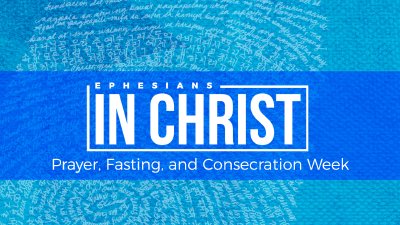Read Ephesians 4:
“I therefore, a prisoner for the Lord, urge you to walk in a manner worthy of the calling to which you have been called . . .” — Ephesians 4:1
In Ephesians 1 to 3, the Apostle Paul described the spiritual reality of every believer in Christ. Beginning in chapter 4, he shifts his focus to emphasize the practical outworking of this new identity. Paul’s exhortation is clear. What we believe determines how we behave. How we see ourselves directly impacts how we will act. And because we are now in Christ we can walk in a manner worthy of his calling.
On one side, this is a challenge to daily embrace the Holy Spirit’s ongoing work of sanctification. We are called to walk in the light. The more we walk in the truth of the gospel, the less we will tolerate darkness to linger in our soul.
But Paul goes beyond our inward life. He connects acting in a manner befitting Jesus’ name to our calling to walk in unity with other believers. We exemplify our reconciliation with Christ most when we actively engage in behavior that builds relational bridges and promotes unity in diversity.
Jesus is our best standard and example for this, but we must always remember that He is also the way by which we can walk worthy of our calling. The list of relational virtues Paul gives—humility, gentleness, patience, and love—reflect the outward fruit of a life rooted in Christ’s amazing grace. We cannot live out any aspect of our calling apart from him.
Apply:
1. What does it mean for you to “walk in a manner worthy of the calling?” How can you reflect more of his grace in your life and relationships today?
2. In Ephesians 4:11–16, how does Paul describe the role the local church plays in spiritual growth? What is our role in the local church? How can you be more engaged in your local church community?
3. What one thing will you change today as a result of what the Holy Spirit has revealed to you through this study?
Pray:
*Pray to Experience His Inner Strength*
“That according to the riches of his glory he may grant you to be strengthened with power through his Spirit in your inner being.” — Ephesians 3:16
Heavenly Father, I recognize my absolute dependence on you. In and of myself, I am weak. My heart and my flesh will fail me, but you are my strength and my portion. Strengthen my inner being with power through your Holy Spirit. Enable me to confront the trials before me with boldness, courage, and faith that your Spirit in me is greater than any hindrance or opposition I will face in the world. I declare that I am more than a conqueror through Christ who strengthens me. Amen!
“One in Christ”
Clara M. Brooks (1907)
As sweet strains of heav’nly music
Blend in one harmonious sound,
So the members of Christ’s body
In blest unity are found—
One in mind, and one in spirit,
One in doctrine, faith, and love;
One in name—oh, precious union,
Like the angel hosts above.
Not like waves upon the ocean,
Tossing wildly, rolling high;
Or the tempest’s great commotion,
As it sweeps across the sky;
But like twilight, gently stealing
O’er the verdant, shady lea,
So the holy saints in Zion
Rest—from all their sins set free.
Blood-washed pilgrims on the highway
Chant the sweet, melodious strain
Of their freedom from confusion,
Angels join the glad refrain;
One with all the hosts of heaven,
There their names are written down;
Jesus only, Jesus ever,
In their hearts as King they crown.
Love, the theme of all their praises,
Doth in holy bond unite
All their hearts, in Him made perfect,
Turned from darkness unto light;
Thus the saved in Christ together
Dwell in sacred unity,
In the secret of His presence—
Hid away, dear Lord, in Thee.

Day 3
Walk Worthy
Ephesians 4
More from
In Christ







